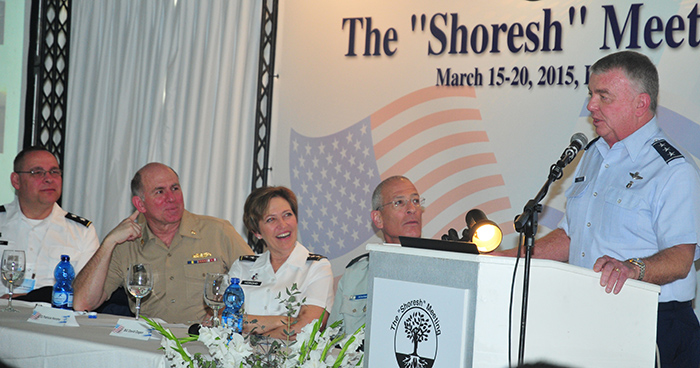USAMRMC Collaborates with Israeli Medical Researchers at Shoresh 2015

Representatives from U.S. and Israeli military medicine participated in the 17th U.S. ' Israel Shoresh Conference March 15-20, in Ramat Gan, Israel, to discuss a broad spectrum of issues relevant to medical research and response.
Commanding General of the U.S. Army Medical Research and Materiel Command Maj. Gen. Brian C. Lein co-hosted the event with Israel Defense Forces Surgeon General, Brig. Gen. David J. Dagan. The exchange included a delegation of more than 90 scientists from the U.S. Army, Navy, Air Force, Army National Guard and other Department of Defense organizations.
Distinguished attendees at this year's conference included Lt. Gen. Patricia D. Horoho, surgeon general of the Army and commanding general of the U.S. Army Medical Command; Vice Adm. Matthew L. Nathan, the surgeon general of the Navy and chief of the Navy's Bureau of Medicine and Surgery; Lt. Gen. Thomas W. Travis, the surgeon general of the Air Force; and Maj. Gen. David E. Wilmot, the deputy surgeon general for the Army National Guard. This marked the first time that all three service surgeons general attended the Shoresh meeting.
The conference included both plenary sessions and break-out groups. Lein and Dagan led the first of four plenary sessions discussing medical research needs and priorities. Next on the agenda was a panel discussion by the surgeons general covering recent military medical challenges and priorities. Col. Tarif Bader, IDF deputy surgeon general, followed sharing medical lessons learned from recent military operations. Col. Neal E. Woollen, director of biosecurity with the U.S. Army Medical Research Institute of Infectious Diseases, concluded the plenary session with a recount of the USAMRMC's Ebola response efforts.
In addition to learning about these key issues, attendees participated in eight concurrent working groups. Sessions addressed cross-cutting topics in physiological stress, infectious diseases, combat casualty care, mental health, aerospace medicine, naval medicine, chemical and biological defense and military forensics. Many of these collaborative sessions included off-site visits to Israeli research facilities, rehabilitation hospitals, and Army, Navy and Air Force installations. According to officials, the visits allowed attendees to see Israeli research capabilities in-person. This in-turn, permitted participants to see ideas discussed during previous meetings put into practice.
 An official website of the United States government
An official website of the United States government
 ) or https:// means you've safely connected to the .mil website. Share sensitive information only on official, secure websites.
) or https:// means you've safely connected to the .mil website. Share sensitive information only on official, secure websites.


